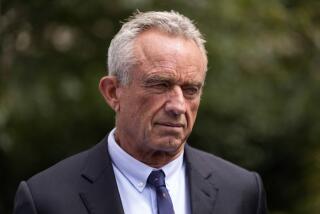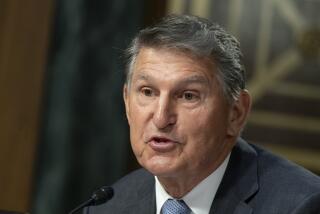Harkin Reported Ready to End Campaign Bid
- Share via
WASHINGTON — Iowa Sen. Tom Harkin, who captured his state’s presidential caucus but no subsequent primaries, has decided to end his campaign for the Democratic nomination, sources close to the candidate said Sunday.
Harkin met during the day with advisers here as they attempted to assess his campaign in the wake of a disappointing single-digit showing in Saturday’s South Carolina primary. Harkin had made a special effort to attract black voters there, campaigning with the Rev. Jesse Jackson and making an issue of comments that rival Arkansas Gov. Bill Clinton had made about Jackson. Nevertheless, Clinton won big, with 63% of the vote to Harkin’s 6%. Harkin’s campaign had admitted before the South Carolina vote that it had no funds to campaign further unless he did well there.
After the meetings Sunday, Harkin aides announced that he will conduct two news conferences this morning, one in Washington and another in Des Moines.
A source close to the campaign said that Harkin will announce his withdrawal during the news conferences.
“It’s over,” the source said. “He’s out of money and the campaign can’t go on. That’s what he is going to say at the press conferences.”
Harkin’s financial situation was made all the more perilous because he was about to lose federal matching funds. Because he had failed to get at least 10% of the vote in two consecutive primaries, federal funds would have stopped in a month unless he won at least 20% of the vote in a primary before then.
Caucuses do not count, so his overwhelming victory in Iowa was no help to him. Nor was the fact that he was thought to have done well in two caucuses last Tuesday--Minnesota and Washington. Those results are not yet final, but even if he had won both states he would have lost his federal funds. The federal government matches individual contributions up to $250 each.
Lorraine Voles, Harkin’s press secretary, refused to reveal what Harkin would say at the news conferences. But she acknowledged that he has no campaign appearances scheduled after today--despite the Super Tuesday contests the next day, when 11 states will be at stake.
When asked if the Harkin campaign was disbanding, she said: “I can’t confirm that.”
Harkin would become the third major Democrat to drop out of the race. Virginia Gov. L. Douglas Wilder quit before any primaries were held, and Nebraska Sen. Bob Kerrey ended his campaign after dismal showings in last Tuesday’s primaries and caucuses. Kerrey had won one primary, in South Dakota, but had failed to capitalize on that success.
The major Democrats remaining in the race are Clinton, former Massachusetts Sen. Paul E. Tsongas and former California Gov. Edmund G. (Jerry) Brown Jr.
Harkin was elected to the Senate in 1984 and reelected in 1990 in campaigns that ran counter to the conservative mood of voters that sent Ronald Reagan and later Bush to the White House. Before entering the Senate, Harkin served for 10 years in the House of Representatives.
During his presidential campaign, he described himself as an “old-fashioned liberal” and compared himself to Franklin D. Roosevelt, Harry S. Truman and John F. Kennedy. To answer criticism that a liberal could not win the White House, he pointed out that Roosevelt, Truman and Kennedy all had. He often said he was fighting for the “heart and soul” of the Democratic Party.
Harkin advocated cutting the defense budget to pay for massive federal jobs programs aimed at improving the nation’s infrastructure and to improve domestic and social ills.
Harkin got into the race last September, attracting favorable reviews from labor groups and some liberal Democrats, with broad and caustic attacks aimed at President Bush’s economic policies.
Initially, he had little trouble raising money, in large part because of his affiliation with organized labor. But when his electoral support lagged, so did his fund raising, and he was unable to overcome his low national profile among voters.
“We had money problems all along,” one Harkin staffer said Sunday in a post-mortem on the campaign. “Once you’ve been tagged a liberal, it’s harder than hell to raise money. And, after our poor showing in the last two or three primaries, (money) was just cut off from all sources.”
Sources said Harkin would not endorse any of his rivals before the convention.
Harkin’s campaign had drawn its strongest support from many organized labor groups. Staffers said the senator was hoping to remain an active candidate until primary contests in the labor-strong states, such as Michigan and Illinois, which vote March 17.
Harkin also had hoped for an impressive showing in South Carolina, where he campaigned with Jackson and aggressively sought black voters during the week before the primary. He made an issue of comments Clinton made when told--erroneously--that Jackson was endorsing Harkin.
Thinking the microphone was off, Clinton told an aide that Jackson had stabbed him in the back. Harkin also cited a newspaper photo of Clinton and Georgia Sen. Sam Nunn at a prison-type work camp, at which Clinton and Nunn stood in front of a group of prisoners, most of them black. But Harkin came in a distant third, behind Clinton and Tsongas.
“I’m not saying the campaign was poorly run,” said one Harkin supporter. “But he got into the race too late. By the time he entered, Clinton had been running for two years and had all the power people behind his campaign.”
More to Read
Get the L.A. Times Politics newsletter
Deeply reported insights into legislation, politics and policy from Sacramento, Washington and beyond. In your inbox twice per week.
You may occasionally receive promotional content from the Los Angeles Times.










